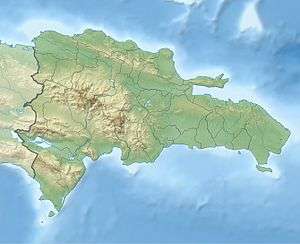Salcedo, Dominican Republic
| Salcedo | |
|---|---|
 Salcedo | |
| Coordinates: 19°25′12″N 70°23′24″W / 19.42000°N 70.39000°WCoordinates: 19°25′12″N 70°23′24″W / 19.42000°N 70.39000°W | |
| Country |
|
| Province | Hermanas Mirabal |
| Area[1] | |
| • Total | 190.6 km2 (73.6 sq mi) |
| Elevation[2] | 196 m (643 ft) |
| Population (2012)[3] | |
| • Total | 45,299 |
| • Density | 240/km2 (620/sq mi) |
| • Demonym | Salcedense |
| Distance to – Santo Domingo |
160 km |
| Municipalities | 1 |
Salcedo is the capital city of the Hermanas Mirabal Province in the Dominican Republic.
It is famous for being the birthplace of the Dominican heroines, the Mirabal sisters who gave their lives in the struggle against the dictator Rafael Trujillo. There is a museum in the town, Ojo de Agua (lit. Water Eye but also spring) commemorating three of sisters who were killed in the struggle against dictatorship. It was tended to by the remaining sister, Bélgica (Dedé) Mirabal, until her death on February 1, 2014[4].
The city is named after Francisco Antonio Salcedo who fought in the northwestern part of the country against the Haitian army during the Dominican-Haitian War after the Dominican independence from Haiti in 1844.
Geography
Salcedo is located in the Cibao Valley, south of the Cordillera Septentrional (in English, "Northern mountain range"). It has a total area of 432.95 km².[1] It has only one municipal district (a subdivision of a municipality): Jamao Afuera.[5]
Climate
| Climate data for Salcedo, Dominican Republic (1961–1990) | |||||||||||||
|---|---|---|---|---|---|---|---|---|---|---|---|---|---|
| Month | Jan | Feb | Mar | Apr | May | Jun | Jul | Aug | Sep | Oct | Nov | Dec | Year |
| Record high °C (°F) | 35.3 (95.5) |
35.7 (96.3) |
36.8 (98.2) |
37.3 (99.1) |
37.6 (99.7) |
39.4 (102.9) |
39.5 (103.1) |
38.7 (101.7) |
37.1 (98.8) |
37.1 (98.8) |
36.5 (97.7) |
36.0 (96.8) |
39.5 (103.1) |
| Average high °C (°F) | 29.1 (84.4) |
29.4 (84.9) |
30.7 (87.3) |
31.3 (88.3) |
31.7 (89.1) |
32.5 (90.5) |
32.5 (90.5) |
32.5 (90.5) |
32.8 (91) |
32.1 (89.8) |
30.7 (87.3) |
29.1 (84.4) |
31.2 (88.2) |
| Average low °C (°F) | 18.7 (65.7) |
18.8 (65.8) |
19.4 (66.9) |
19.9 (67.8) |
20.7 (69.3) |
21.5 (70.7) |
21.4 (70.5) |
21.3 (70.3) |
21.1 (70) |
20.7 (69.3) |
19.8 (67.6) |
19.0 (66.2) |
20.2 (68.4) |
| Record low °C (°F) | 13.5 (56.3) |
14.0 (57.2) |
14.0 (57.2) |
14.1 (57.4) |
15.0 (59) |
16.1 (61) |
16.5 (61.7) |
17.0 (62.6) |
16.3 (61.3) |
16.2 (61.2) |
15.7 (60.3) |
15.0 (59) |
13.5 (56.3) |
| Average rainfall mm (inches) | 82.7 (3.256) |
73.2 (2.882) |
75.7 (2.98) |
107.5 (4.232) |
152.7 (6.012) |
79.1 (3.114) |
108.9 (4.287) |
131.0 (5.157) |
113.4 (4.465) |
124.7 (4.909) |
157.9 (6.217) |
134.2 (5.283) |
1,341 (52.795) |
| Average rainy days (≥ 1.0 mm) | 10.8 | 8.5 | 8.6 | 8.8 | 11.6 | 8.8 | 12.1 | 11.5 | 9.8 | 11.2 | 12.8 | 13.3 | 127.8 |
| Source: NOAA[6] | |||||||||||||
History
In the place where is now the city of Salcedo there was a very small town with the name of Juana Núñez. It was made a Puesto cantonal (an old category that now is called Municipal District) in 1880 as part of the old La Vega province.[7]
With the creation of the Espaillat province in 1885, Juana Núñez was made part of this new province. In 1891, its name was changed from Juana Núñez to the present one, Salcedo.
Salcedo was made a municipality in 1905 and, when the Salcedo Province (now Hermanas Mirabal Province) was created in 1952, the city became the head municipality of the new province.
Economy
Farming is the only economic activity in the municipality, except for some very small industries; the main products are plantain, cassava and cacao.
Sister cities
Interesting facts
The city became wide known outside of the Dominican Republic due to the Youtube video with an unusual request from the listener of a local radio station to play a song with the words "Essos son Reebok o son Nike" (meaning actually "Are they Reebok or Nike?").
References
- 1 2 Superficies a nivel de municipios, Oficina Nacional de Estadistica Archived 2009-04-17 at the Wayback Machine.
- ↑ De la Fuente, Santiago (1976). Geografía Dominicana (in Spanish). Santo Domingo, Dominican Republic: Editora Colegial Quisqueyana.
- ↑ Censo 2012 de Población y Vivienda, Oficina Nacional de Estadistica
- ↑ Garcia, Franklin (2014-02-03). "Last Surviving Mirabal Sister, Doña Dede, Dead at 88". Huffington Post. Retrieved 2018-08-01.
- ↑ Oficina Nacional de Estadística. "División Territorial 2008" (in Spanish). Archived from the original (PDF) on 2010-04-14. Retrieved 2009-10-01.
- ↑ "Salcedo Climate Normals 1961-1990". National Oceanic and Atmospheric Administration. Retrieved September 19, 2016.
- ↑ Pouerié Cordero, M.M (1997). Síntesis de ciudades, pueblos e islas del país (in Spanish). Santo Domingo, Dominican Republic: Impresora Mary.